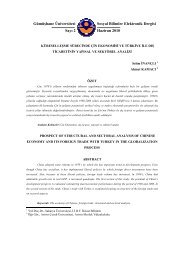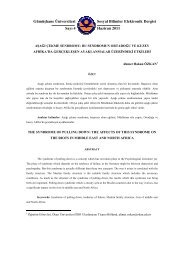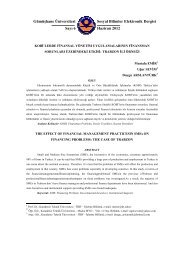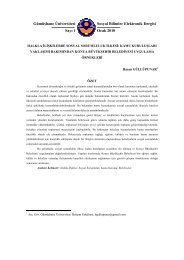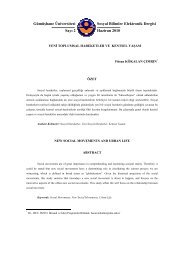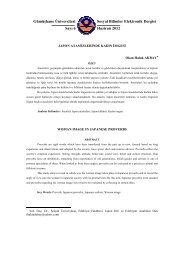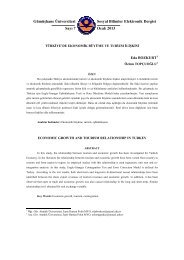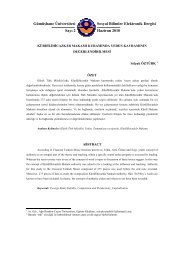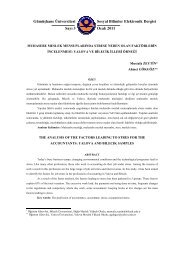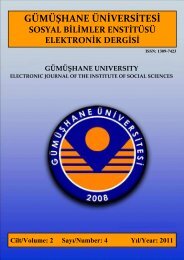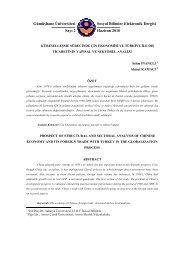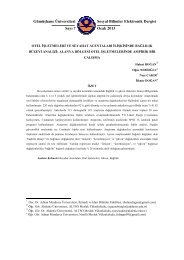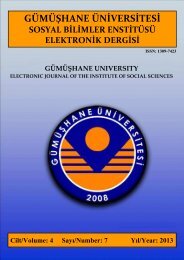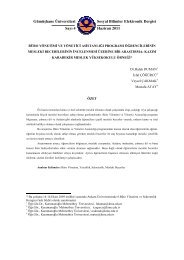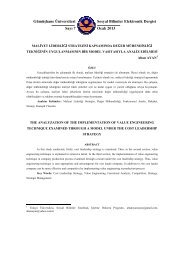S - GÜ SBE Elektronik Dergisi - Gümüşhane Üniversitesi
S - GÜ SBE Elektronik Dergisi - Gümüşhane Üniversitesi
S - GÜ SBE Elektronik Dergisi - Gümüşhane Üniversitesi
Create successful ePaper yourself
Turn your PDF publications into a flip-book with our unique Google optimized e-Paper software.
Globalization and Its Effects on Nation-State Ekrem Yaşar AKÇAY<br />
CONCLUSION<br />
Despite all ofthese crisis and several definition that is post-modernism or continued of<br />
modernism, globalization has become concept that has been in our life. (Bolay, 2003: 63-73,<br />
Aslan and Yılmaz, 2003: 75-93) I have to mention that ıt is unavoidable and ıt effects several<br />
things. One of these is also natıon-state. I have to remind again that Within the globalization ıt<br />
didn’t destroy, ıt is alive. It only changed the shape especially about sovereignity and borders.<br />
We also have to know, accept and accustom to its conditions. Namely, ıt learned to live with<br />
globalization.<br />
Nation-State that we couldn’t give a clear time, occured with Westphalia Treaty in<br />
1648. It is clearly a state that self-identities as deriving its political legitimacy from serving as a<br />
soverign entity for a nation as a sovereign territoral unıt. The state is a political and geopolitical<br />
entity. The term of nation-state implies that the two geographically coincide and this<br />
distinguishes the nation-state from the other types of state which historically preceed it. Within<br />
the globalization, actually, it began to live some changes especially about border and<br />
soverignity.<br />
As we knew formerly in the nation-state, borders were clear. Nobody could invade these<br />
borders, nobody could interfere in the other state’s domestic affairs. Because this was a war<br />
crime or casus belli. Actually, this style was named as Style of Westphalian Nation-State.<br />
Within the globalization this style began to change. Borders didin’t destroy, but border<br />
soverignity changed. In the result of the information revolution, custom of goods, capital, labor<br />
force began to make without thinking the borders. Then decision-making and implements of<br />
authority changed. Formerly there was only one political authority, but now it increased with<br />
NGO’s. Namely, nation-states stil continue but they contaminated the changing process.<br />
Nation-States stil continue but now supranational structures are more effective such as<br />
EU, UN and the nation-states also are member of these structures such as Germany, Holland,<br />
France. These structures can sometimes limit the sovereignity of nation-states for example about<br />
human rights. Despite this sitution, we can’t say that nation-states destroy. Even if they don’t<br />
effect as is the case in formerly, they stil effective. For example, in Germany, to be German<br />
citizenship, people have to learn German language. Thus, we can’t say that, nation-states<br />
59



